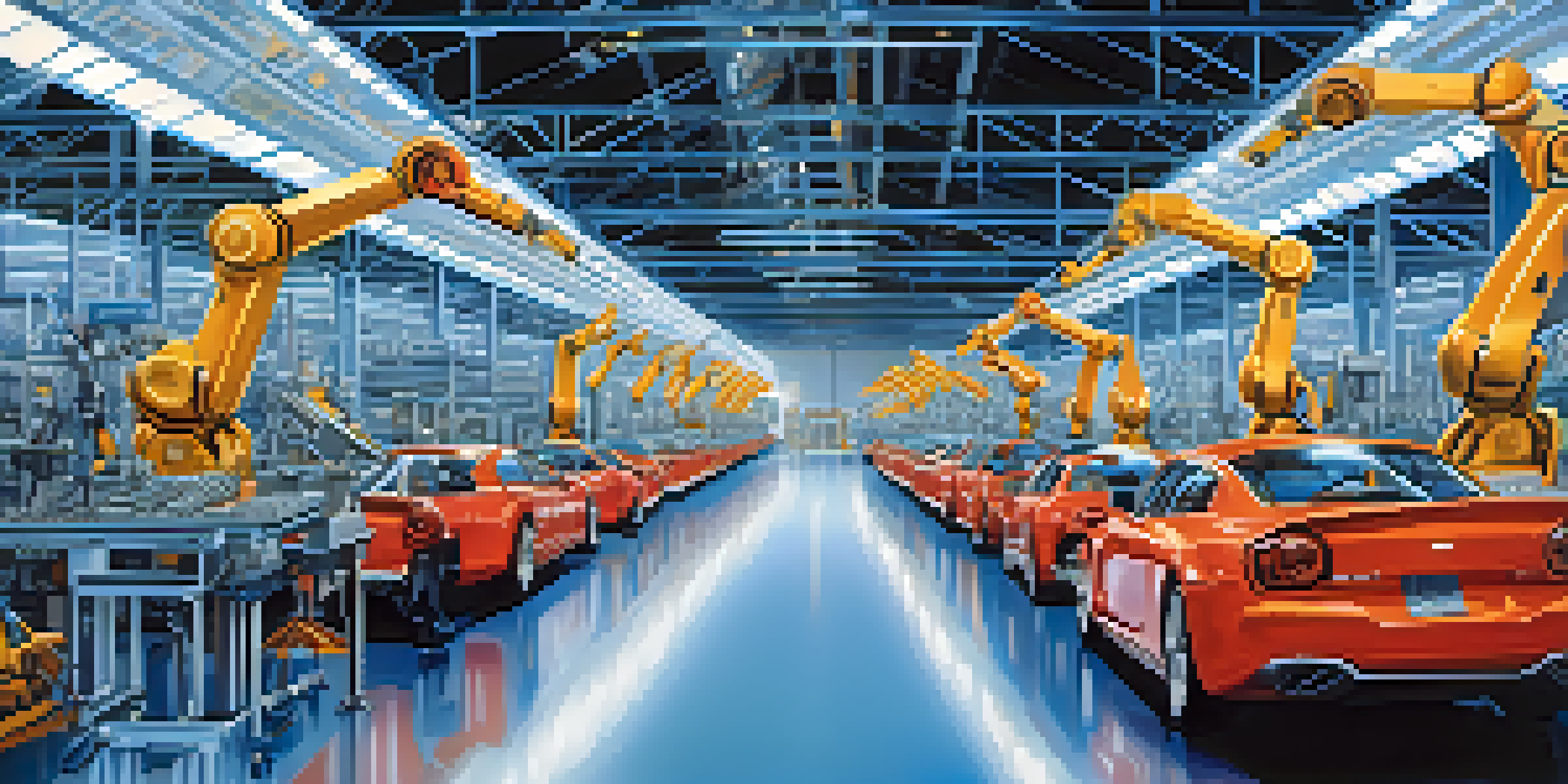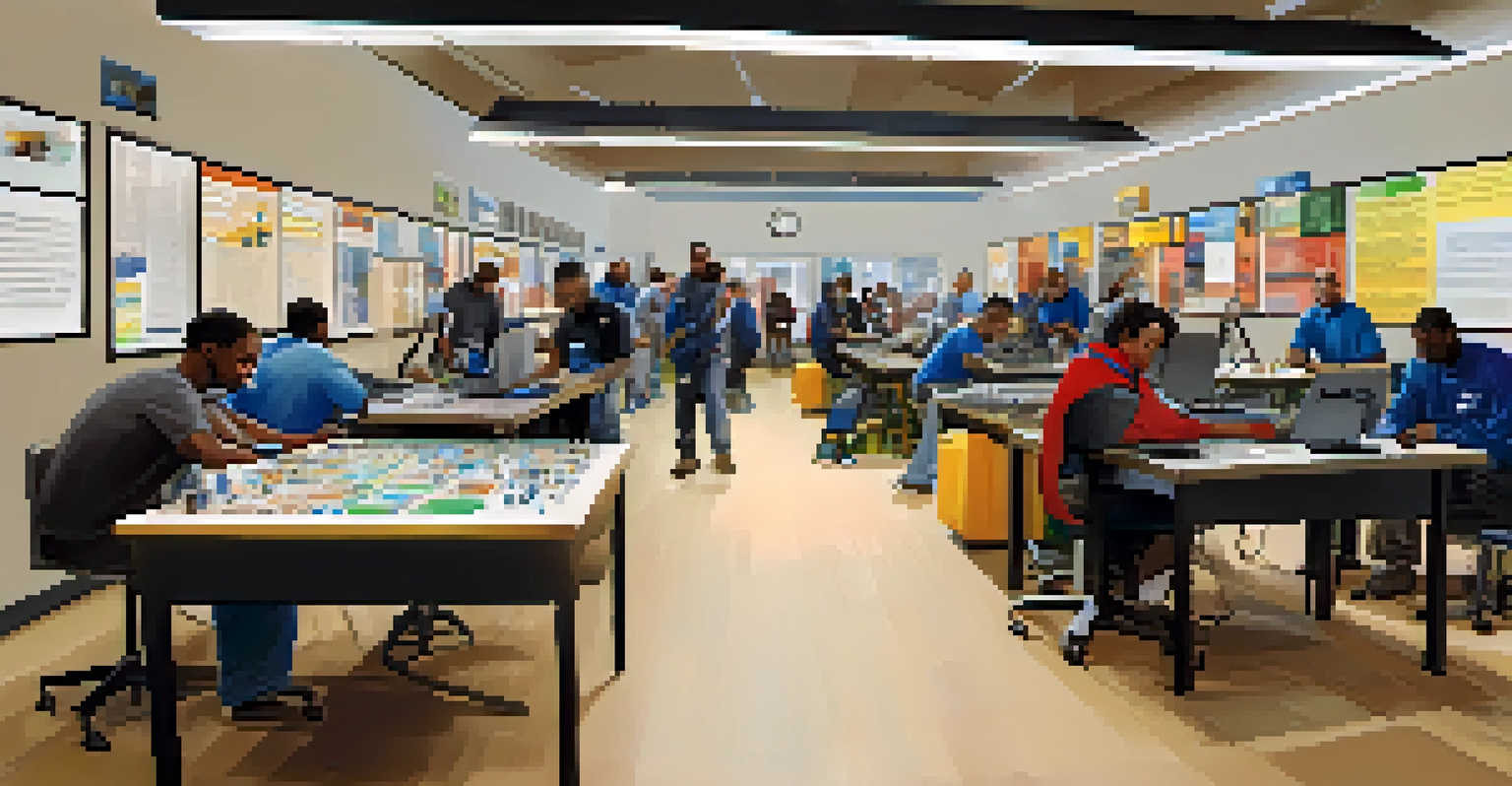Impact of Automation on Detroit's Workforce and Economy

Understanding Automation and Its Rise in Detroit
Automation refers to the use of technology to perform tasks without human intervention. In Detroit, a city known for its manufacturing legacy, automation has become more prevalent as companies seek efficiency and cost savings. This shift is often seen in the automotive industry, where robotic systems now handle assembly line tasks that were once done by hand.
Automation is not just a tool; it’s a pathway to a new way of living and working.
The rise of automation is driven by advancements in technology, such as artificial intelligence and machine learning. These innovations allow machines to learn and adapt, making them more effective in performing complex tasks. For Detroit, this means a significant transformation in how products are made and how businesses operate.
While automation promises increased productivity, it also raises questions about its impact on the workforce. As machines take over routine tasks, the demand for certain jobs decreases, prompting discussions about job displacement and the future of work in Detroit.
The Economic Benefits of Automation in Detroit
Automation can lead to substantial economic benefits, particularly in a city like Detroit, where the manufacturing sector is vital. By increasing efficiency, businesses can produce more goods at a lower cost, enabling them to compete in a global market. This can lead to higher profits and, in turn, more investments in the local economy.

Moreover, automation can drive innovation. As companies adopt new technologies, they often seek to improve their processes and develop new products. This culture of innovation can create new business opportunities and potentially lead to the emergence of tech startups in the region.
Automation Drives Economic Change
Automation in Detroit enhances efficiency in manufacturing, boosting the local economy while creating a need for workforce adaptation.
However, it's essential to balance these benefits with the potential downsides. While automation can boost productivity, it can also create a divide where only those with advanced skills benefit from the new economy, leaving others behind. This highlights the need for worker retraining and education initiatives in Detroit.
Job Displacement: A Real Concern for Detroit Workers
One of the most significant concerns regarding automation is job displacement. As machines take over tasks, many workers, particularly those in manufacturing, face the risk of losing their jobs. In Detroit, where the automotive industry has long been a cornerstone of employment, this shift can have profound effects on the local workforce.
The greatest danger in times of turbulence is not the turbulence; it is to act with yesterday’s logic.
Studies indicate that certain jobs may become obsolete while others will evolve. For instance, roles focused on manual assembly might diminish, but positions related to machine maintenance, programming, and oversight could see growth. This transition, however, requires workers to adapt and acquire new skills.
The challenge lies in ensuring that displaced workers have access to training programs that can help them transition into these new roles. Community colleges and vocational training centers in Detroit play a crucial role in offering these opportunities, thus supporting workers in navigating this changing landscape.
Reskilling: Preparing Detroit's Workforce for the Future
As automation continues to reshape the job market, reskilling has emerged as a vital strategy for Detroit's workforce. Reskilling involves teaching existing employees new skills to help them transition into different roles or industries. This approach not only benefits the workers but also strengthens the economy by ensuring a skilled labor force.
Programs focused on reskilling can take many forms, from short courses in coding and robotics to more comprehensive vocational training. Local businesses, educational institutions, and government agencies must collaborate to create effective training programs that align with industry needs.
Job Displacement is a Key Concern
The rise of automation poses significant risks of job displacement, particularly for workers in traditional manufacturing roles.
By investing in reskilling initiatives, Detroit can cultivate a workforce that is adaptable and resilient. This proactive approach not only helps individuals find new employment opportunities but also positions the city as a leader in workforce development amid the automation wave.
The Role of Automation in Economic Inequality
While automation has the potential to boost the economy, it can also exacerbate economic inequality. In Detroit, as in many cities, the benefits of automation are not evenly distributed. Those with higher education and technical skills often reap the rewards, while those in lower-skilled positions face job loss and stagnant wages.
This growing divide can lead to significant social challenges. Communities that rely heavily on manufacturing jobs may struggle to adapt to the new economic landscape, leading to increased poverty and reduced quality of life. Addressing these disparities is crucial for ensuring that all residents benefit from automation.
To combat economic inequality, policymakers and community leaders must focus on inclusive growth strategies. This includes creating pathways for education and training that are accessible to all, as well as supporting small businesses and entrepreneurs who can drive job creation in the local economy.
Automation and the Future of Detroit's Economy
Looking ahead, automation will undoubtedly play a central role in shaping Detroit's economy. As technology continues to advance, businesses will increasingly rely on automated systems to remain competitive. This trend could lead to the emergence of new industries and job opportunities that we can't yet imagine.
However, navigating this transition requires strategic planning and collaboration among stakeholders. Local government, businesses, and educational institutions must work together to create an environment conducive to innovation while ensuring that workers are not left behind.
Reskilling is Essential for Workers
To counteract job displacement, reskilling programs are crucial for helping Detroit's workforce transition to new roles in an automated economy.
Ultimately, the future of Detroit's economy will depend on how well it adapts to these changes. By embracing automation while prioritizing workforce development and inclusivity, the city can position itself for sustainable growth and prosperity in the years to come.
Community Responses to Automation Challenges
In response to the challenges posed by automation, various community organizations in Detroit have stepped up to support affected workers. These organizations often provide resources like job placement services, counseling, and training programs aimed at helping individuals transition into new careers. Their efforts are crucial in mitigating the negative impacts of automation on the workforce.
Moreover, community engagement is vital in fostering discussions about automation's implications. Town halls, workshops, and forums allow residents to voice their concerns and ideas, helping to shape local policies that address the needs of the community. This grassroots approach can lead to more effective solutions that resonate with the people most affected.

By building a supportive network within the community, Detroit can create a more resilient workforce that is equipped to face the challenges of automation. These collective efforts are essential for ensuring that the benefits of technological advancements are shared broadly across the community.